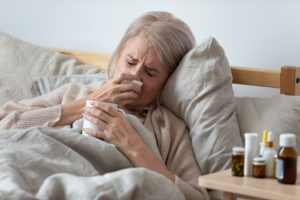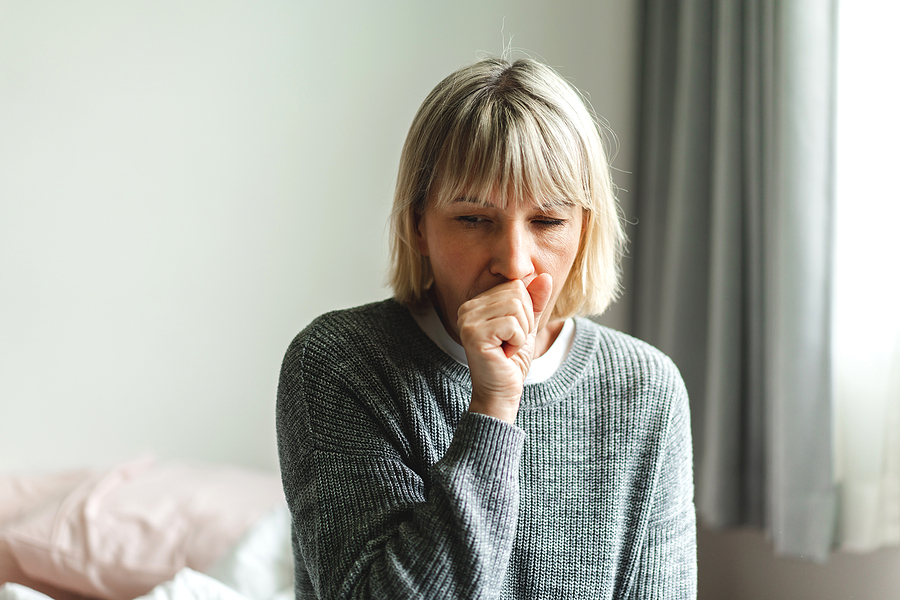Have you got a cold or Covid? The symptoms can look the same say experts
How can you tell if you have an ordinary cold or Covid? The symptoms can be identical which means you’ll need to get tested.
In pre-pandemic days, if you got a sniffle and a headache, you’d just think you had an ordinary cold and would probably carry on as normal, even if you did feel rough. But now, as we enter cold and flu season, how can you be sure it’s a cold and not Covid?
The bottom line is – you can’t. Because while the typical symptoms of a cold are a headache, sore throat and runny nose, those symptoms are now some of the main signs of Covid too.
Christina Marriott, chief executive of the Royal Society for Public Health (RSPH) says: “Growing evidence shows that people who’ve received two doses of the vaccine typically present with less severe symptoms, such as headache, runny nose, sneezing, sore throat, and loss of smell.
“As the flu season approaches, it’s important for people who’ve been fully vaccinated to stay vigilant for cold-like symptoms, and get tested if they’re living or working around people who are at greater risk from the disease.”
Professor Irene Petersen, a professor of epidemiology and health informatics at University College London (UCL), adds: “A runny nose and headache are symptoms of many infections, but may also be the first symptoms – and only symptoms – of Covid. Therefore, if you have these symptoms, I’d encourage you to use lateral flow tests (LFT) for a couple of days.
“The first few LFT tests may be negative, but if you have Covid the tests are likely to become positive within a couple of days. Also, if you know other people around you have Covid, the likelihood your runny nose and/or headache is also Covid is much higher.”
Although the main Covid symptoms drummed into us by the government are a high temperature, a new, continuous cough, and a loss or change to your sense of smell or taste, the Delta variant, which is now the dominant Covid strain in the UK, has different symptoms, either instead of, or as well as, those main symptoms.
The Zoe Covid Symptom Study, which is funded by the UK government, has identified the current top five symptoms to have emerged and says they differ slightly depending on whether you’ve been vaccinated or not. They are…

Headache
Although headaches are a less well-known symptom of Covid, they are one of the earliest signs, according to the ZOE Study, and are more common than the classic symptoms of cough, fever and loss of smell. The study found Covid headaches tend to be moderate to severely painful, can be ‘pulsing’, ‘pressing’ or ‘stabbing’, occur across both sides of the head rather than in one area, may last for more than three days, and tend to be resistant to regular painkillers.
Runny nose
In the early days of the pandemic, it was thought a runny nose wasn’t a Covid symptom and was much more likely to be a sign of a regular cold. But now, the ZOE study has found that prevalence of Covid is a factor – so when Covid rates are high, the chances of a runny nose being due to Covid is also high. But the study stresses that when Covid rates are low, a runny nose is less likely to be Covid and more likely to be due to a cold or even an allergy.
Sneezing
The ZOE study found sneezing more than usual can be a sign of Covid in people who’ve been vaccinated, although it stresses sneezing is much more likely to be a sign of a cold or an allergy. It says that even though many people with Covid might sneeze, “it’s not a definitive symptom because sneezing is so common”.

Sore throat
Many people with Covid have reported on the ZOE Study app that they have a sore throat that feels similar to the sore throats you get when you have a cold or laryngitis. Covid-related sore throats tend to be mild and last no more than five days, and a very painful sore throat that lasts longer than that is likely to be something else and if it persists you should contact your GP. Although it can be a Covid symptom, most people with a sore throat will probably just have a cold.
Loss of smell
This is one of the more well-known Covid symptoms, and while people who have Covid might not lose their sense of smell completely, it may change, so you may not be able to smell strongly-scented things, and your sense of taste may be affected too, so food may taste different or seem tasteless.
Getting tested is crucial
If you’ve only had one dose of the vaccine, the ZOE study found the top symptoms were similar to those of people who were double-jabbed, but a cough was also common. And for those who were unvaccinated, symptoms were also similar, with the addition of fever and a cough. If you have any of the symptoms, you should self-isolate at home, and get a PCR Covid test as soon as possible.
Alex Richter, a professor of clinical immunology at the University of Birmingham, who is part of a team who’ve developed a test to detect Covid antibodies in people with mild symptoms, says: “It’s impossible to tell the difference between a cold and COVID-19 clinically. They present so similarly that only PCR testing can differentiate between the two. Lateral flow testing can help with screening, but if someone has symptoms, they should go for a PCR swab test.”
And Alan McNally, a professor of microbial evolutionary genomics at the University of Birmingham, who was infectious disease lead at the Milton Keynes Lighthouse Lab – the UK Government’s first flagship COVID-19 testing facility – adds: “If you have any symptoms of respiratory infection you should stay at home to prevent transmission and get a test done. Trying to self-diagnose is a sure-fire way to send COVID-19 case rates soaring again.”
The Press Association
Latest posts by The Press Association (see all)
- 6 mind sports to exercise your brain and keep you sharp - December 20, 2024
- Quiz: What classic Christmas food or drink are you? - December 20, 2024
- Leftover turkey and watercress pie - December 20, 2024
- Catherine and William choose family shot for Christmas card photograph - December 19, 2024
- The best books to watch out for in 2025 - December 17, 2024




















